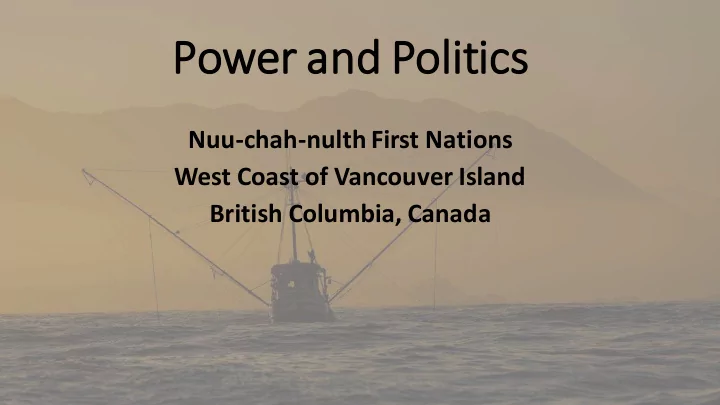

Pow ower and nd Pol olitics Nuu-chah-nulth First Nations West Coast of Vancouver Island British Columbia, Canada
Obj bjective: Contribute e to Community y Livel elihood from sea resources in the Nation’s territories Historical context • Fishing people on the outer west coast of Canada for over 5,000 years • Post-contact populations decimated (~90%) through disease • Cultural and language loss through government “assimilation” programs (e.g., residential schools) and laws prohibiting cultural practices • Specific attacks to restrict “power” of First Nations through Indian Act : • Forced relocation to small coastal “Indian reservations” • Prohibition on large gatherings (e.g., potlatches) and political organizations • Ban on anyone hiring legal representation to pursue claims against government • Not allowed to vote until 1960
Loss ss of Acce ccess s to Fisher eries es (Power Shif ift) • European settlers initially relied on First Nations for fish for food, and local fishing knowledge and harvest methods. Eventually settlers and immigrant fishers displaced indigenous harvesters. • Settlers were assisted by Canadian laws, regulations and policies under Indian Act and Fisheries Act to exclude indigenous fishers. For example: • Prohibiting traditional harvest methods, e.g., salmon weirs and traps • Excluding indigenous harvesters through licence limitation schemes that set thresholds above normal Nuu-chah- nulth harvest levels (halibut 1960’s) No Access, No Money, No Say, No Political Influence = NO POWER
Changing Times? (slowly, very slowly …) • Constitution Act (1982) recognizes and affirms Aboriginal Rights and Title • Largely failed modern-day treaty process, in large part due to refusal of Canada to increase and protect fisheries through treaty process • 2006: Nuu-chah-nulth Nations go to court to have aboriginal rights recognized • 2009: BC Supreme Court rules five Nuu-chah-nulth Nations have Aboriginal Right to “fish and sell” and right infringed by Canada’s regulations and policies • Courts provide 2½ years to negotiate a new fisheries regime (to 2011) • Canada refuses to enter into substantive negotiations (power block); instead sticks to path of integration into existing regular commercial fisheries • Appeals by Canada: 2014 Supreme Court of Canada confirms trial decision
Changing Times es? (new ew gover ernment rhet etoric) c) • 2015: Harper Conservative government replaced by Trudeau Liberals • LOTS of promises and good intentions stated by PM Trudeau and his Ministers about “new relationship with Indigenous Canadians” but has anything changed? • In the Nuu-chah-nulth case, Liberal government DoJ lawyers continued the very aggressive, anti-rights legal position of Conservative government • Concurrent meeting with three key Ministers (Fisheries, Indian Affairs, Justice) June 2016 saying all the right things, but do nothing substantive in next 1½ years to implement rights-based fisheries for five Nations • Fisheries access is the same under “new” government as under Harper Conservative government, despite promises to increase access under preferred means, rights-based fisheries
Communit ity attempts s to gain in power er Nuu-chah-nulth communities employed at least a dozen coordinated strategies, tactics and actions to achieve the objective of increased fisheries access (power gain) • Litigation • Education/awareness • Direct Action • Negotiation • Lobbying • Protests • Collaborative management • Correspondence • Strategic voting • Capacity building • Media • Unilateral mgmt. • Existing government programs Note: come to Session 4E Tuesday at 15:00 (SB 201) on “Conservation and Rights”, joint presentation with Merle Sowman on South African and Nuu-chah-nulth S&T
Communit ity Power er • Communities do have power: strong governance, solid principles, history, persistence, patience, amazing (spiritual) connection place and to sea resources; • but not the kind of power that translates into immediate, tangible results in a modern economy
Conclu clusio ions s (of f a c a car areer First Nations bureaucrat) • Power: government has the power; not clear where the power resides; resistance to change is pervasive within government • Either PM and Ministers are lying directly to Canadians, First Nations and Nuu-chah-nulth or they have little control over their bureaucracies • Likely (hopefully?) the latter; bureaucrats can be very good at controlling outcomes • Existing industries (commercial and recreational fisheries) have power and apparent undue influence over government • Federal political pressure in Canada means changing seats in Parliament; • Nationally, First Nations can influence some swing ridings, but for Nuu-chah-nulth area, Vancouver Island seats are not important to govern in Canada • Real change (power shift) requires multi-generational, strategic, persistent pressure on government • Small steps forward, hopefully smaller steps backward • Long-term: First Nations likely gain power and access to sea resources
Recommend
More recommend